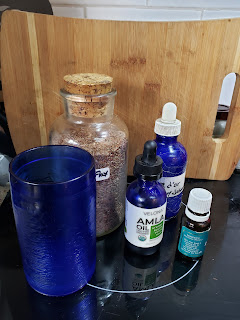Rojo Chiquito - red beans
This week for Earth day, our Climate Action Group hosted several events: Saturday a fair worth talks on reducing use of plastics and recipes/ tips.
On Monday, we joined the worldwide prayers for the earth, and showed the new film Common Ground, which highlights the importance of returning to sustainable agricultural practices.
This morning, I'm soaking Rojo Chiquito beans (du ya • gi ga ge i) - I usually soak beans 4+ hours, then rinse, drain and pre-sprout by repeating the rinse / drain sequence several times over 8-24 hours.
I'll simmer frozen veggie trimmings for stock, and add a splash of vinegar, kombu (seaweed) a bay leaf,yomohi and herbs as I cook the beans.
For making Stock, plus my Rice n Lentils recipes, check out this post. These small red beans will take a bit longer than the lentils, likely 60-90 minutes total.
I Picked up the beans on my Tuesday trip to Wellspent Market (in Mac Mkt on Alpine, near the Tea Garden)
They were grown at Haricot farms in Eastern Washington, and are Food Alliance certified.
'The Food Alliance sustainability standard for crop operations describes in general terms a vision and goals to improve management in the following areas of concern:
• Integrated pest, disease and weed management,
• Soil and water conservation,
• Wildlife habitat and biodiversity conservation,
• Safe and fair working conditions.
Beans grown at Haricot Farms in Eastern Washington are “no-till”. 'Meaning, the soil is not tilled under (disturbed each year).
'Whenever a tractor tills the ground, especially in dry farmland like Eastern Washington, soil is lost to the wind. Moreover tilling destroys the soil structure—a delicate balance of silt, sand, clay and soil microbes.
'Tilling compresses the ground so the soil looses its pockets of air that help hold water when it rains and aids in the movement of nutrients within the soil system. The no-till process ensures that farmers are keeping their soil on their land and healthy.'
Tilling and mono culture on farmland led to the dustbowl in the west! With no till and sustainable practices, farmers can rebuild topsoil, foster fungal networks, and take better care of our 🌎 and relations.
I'll save out some of the beans to inoculate with the bacillilus that promotes nitrogen fixing nodules, and then plant in the Rose Cottage garden.
Do you grow beans?
Have a favorite bean recipe?






Comments
Post a Comment